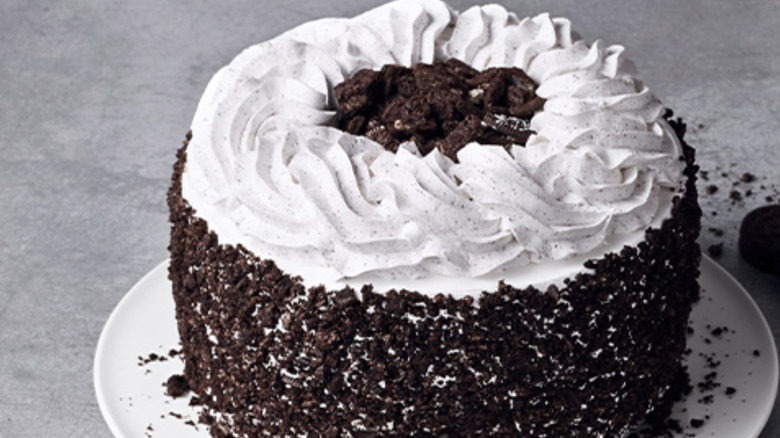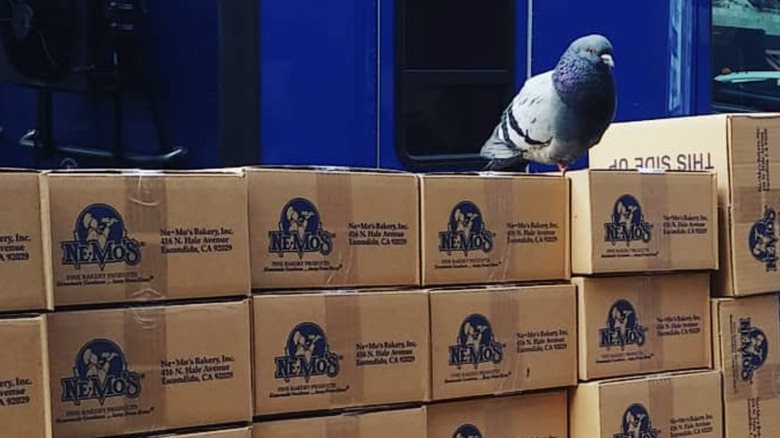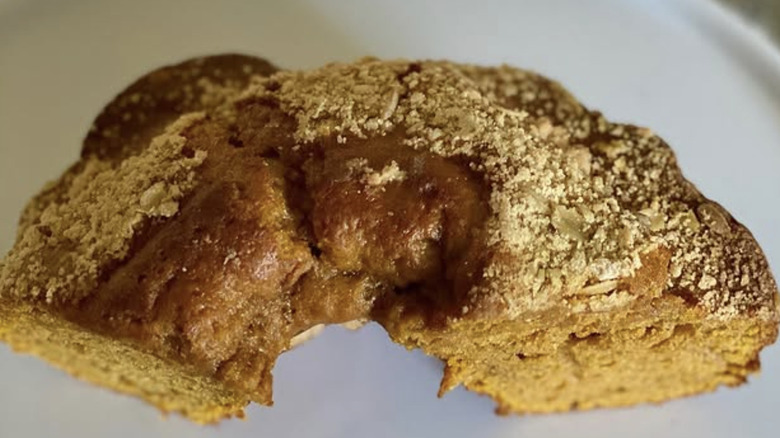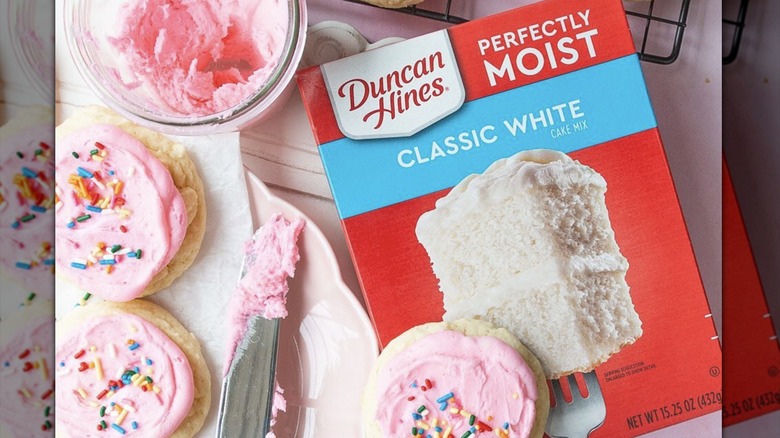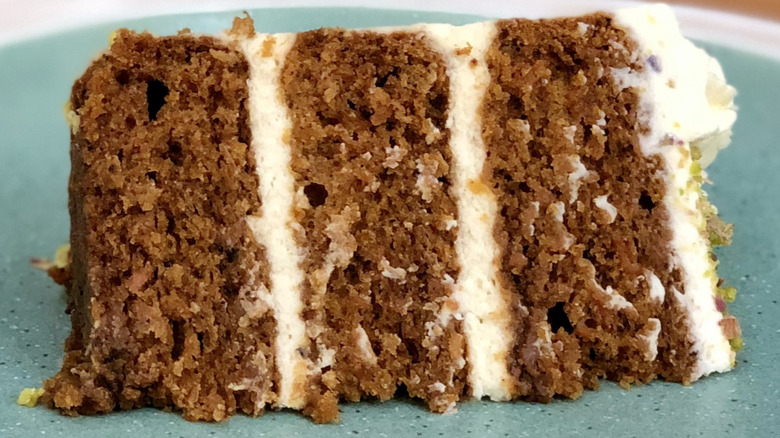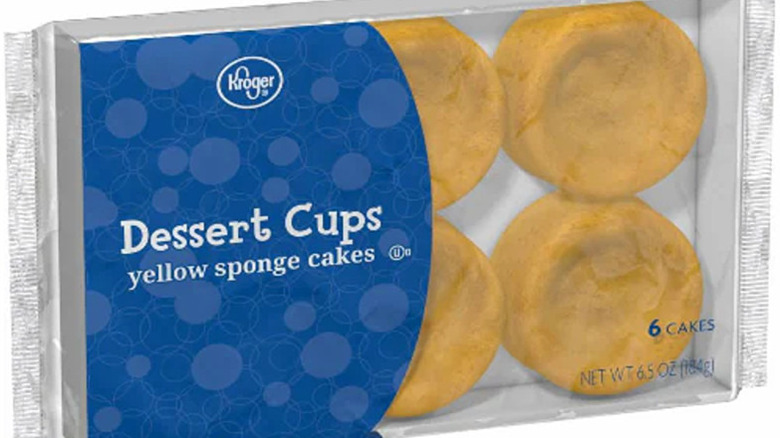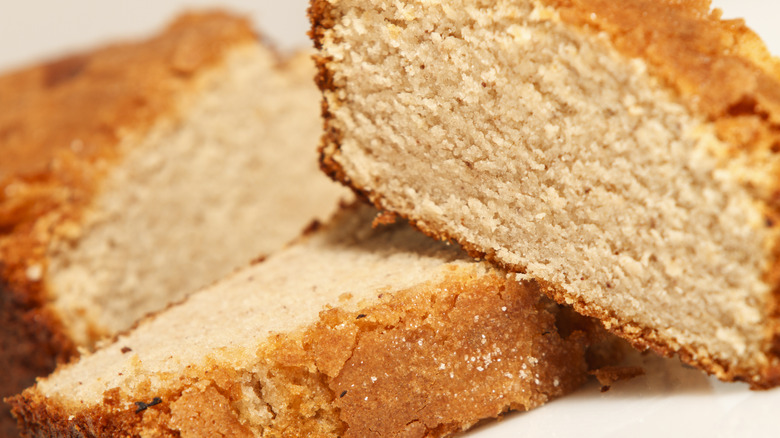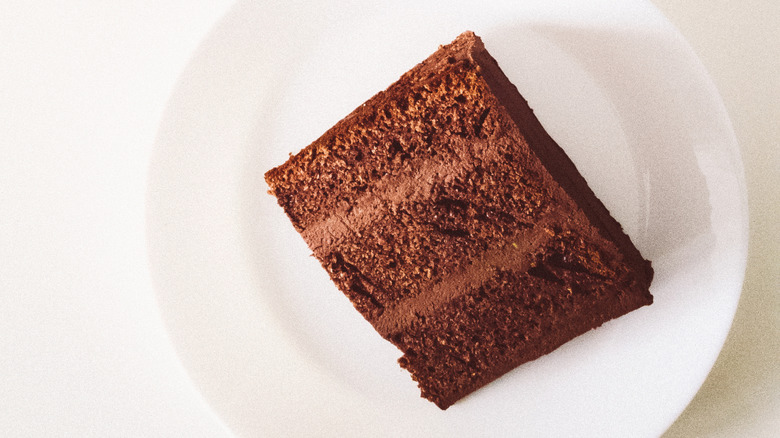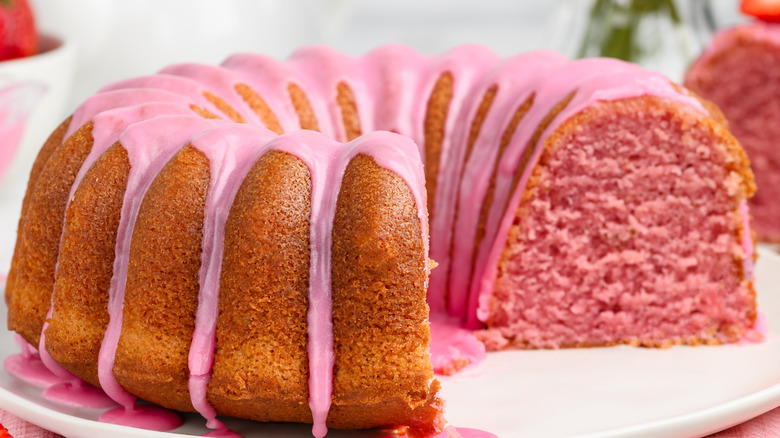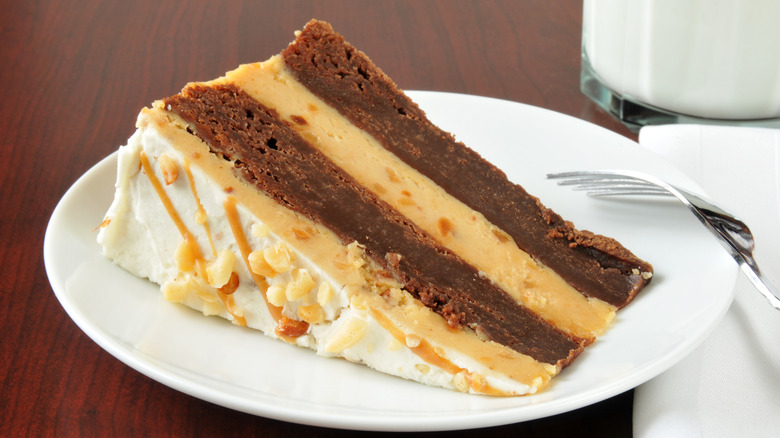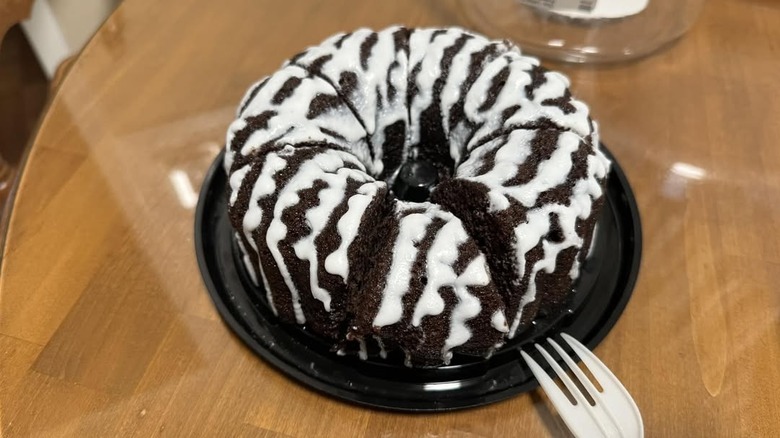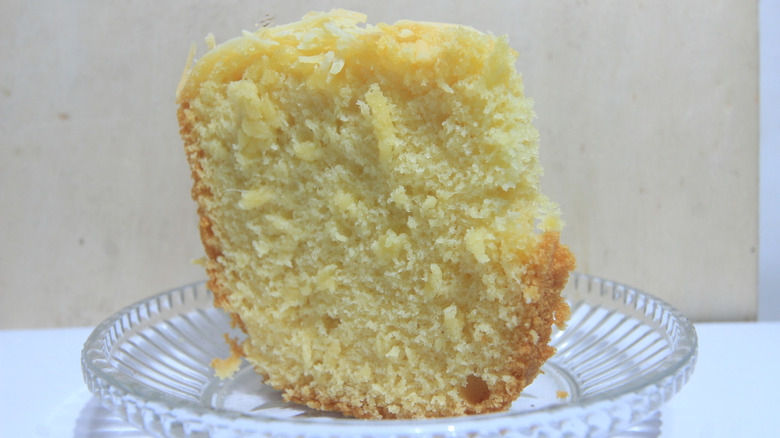The Biggest Cake Recalls In US History
Cake. It's one of those wonderful words that invokes celebration, positive vibes, and all the good stuff. Or at least it's supposed to. Even a food as smile-inducing as cake gets recalled from time to time, and some of the cake recalls of the past have not been pretty.
Premade cakes and cake mixes have fallen prey to mishaps in the production phase, sparking some major recalls along the way. If a food or beverage company wants to sell its products in American stores, all of the food safety standards upheld by the United States Department of Agriculture (USDA) and U.S. Food and Drug Administration (FDA) must be followed to the letter. One deviation in the multi-step process that is food manufacturing, and a company could wind up recalling thousands of pounds of product and endangering countless consumers' lives.
Food recalls are nerve-wracking, expensive ordeals and they happen to businesses both large and small. Here, we'll learn more about companies that were forced to pull their cakes from store shelves to avoid public endangerment, and those that recalled products only after someone got hurt. The reasons behind these cake recalls were often careless, sometimes gross, and every once in a while, totally strange.
Rise Baking Company cakes in 2021
Rise Baking Company's Cookies and Creme Cake and Vanilla Bean Waterfall Cake sound delightful ... as long as you're not allergic to hazelnuts. On March 31, 2021, Rise Baking Company recalled both cake flavors because the hazelnuts inside were not listed on either product label. The York, Pennsylvania, company sold its Cookies and Creme Cake under the Harris Teeter brand name, while the Vanilla Bean Waterfall Cake was sold under the Dawn Foods Products brand. The recall was a heavy situation — 80,088 pounds of mislabeled cake were swept from customers' reach.
The cakes were sold in stores nationwide, but no adverse reactions were ever reported in connection to the recall. Hazelnuts were inadvertently put into the cakes due to an oversight when ownership of the facility that made the cakes changed hands. Rise Baking Company halted production until the matter was fully resolved.
Disposing of that much cake had to hurt, but the risk of causing injury or death to consumers far outweighed Rise Baking Company's financial loss. Hazelnuts and other tree nuts are one of the nine major food allergens for which the FDA requires specific labeling requirements. Other major allergens include peanuts, wheat, soy, eggs, milk, fish, crustacean shellfish, and as of 2023, sesame. Processed foods that contains any of these major allergens must indicate each one by name on the outer packaging's ingredients list, or list them separately as a warning label (i.e. contains hazelnuts). Rise Baking Company's cakes had neither.
Ne-Mo's cakes in 2019
Cake square specialists Ne-Mo's got gross in 2019, when it included a very unexpected ingredient in several flavors of its individually-wrapped cakes. That March, Ne-Mo's customers complained that they were in the process of enjoying their cake squares ... until they found a bird foot inside. On March 10, 2019, Ne-Mo's recalled its Chocolate Cake with Cream Cheese Icing, Red Velvet Cake with Cream Cheese Icing, and Birthday Cake with Buttercream Icing. All three cake flavors were recalled due to bird foot contamination.
Recalls for foreign material are incredibly common. Materials such as plastic, metal, glass, or wood are the usual culprits in this kind of recall because they're often present in a factory environment. Less expected contaminants, like animal parts, also make their way onto the production line every once in a while, and when they do, some seriously strange food recalls can occur. After some errant bird foot made its way into Ne-Mo's cakes, the San Diego-founded company recalled 45,366 pounds worth. The affected cakes were sold in 20 states.
That's a lot of cake, which begs the question: How many bird feet are we talking about here? Ne-Mo's cake squares were made in a facility owned by Horizon Food Group, also based out of San Diego. As creepy as this recall was, neither Ne-Mo's nor Horizon Food Group was forced to provide details, or any public explanation for what happened.
Wegmans cakes in 2018
The bakery section of Wegmans was a little thinned out in November 2018 on account of a manufacturing misstep. The East Coast grocery store chain announced a recall of its store-brand Pumpkin Loaf and Placek Coffee Cake after learning the cakes contained milk that was not disclosed as an ingredient on the packaging. The Pumpkin Loaf was sold in 19-ounce portions and the Placek Coffee Cake (a Polish version that incorporates yeasted dough) was sold in 11-ounce and 22-ounce portions.
The undeclared allergen found its way into the cakes by way of a streusel topping (a typical streusel recipe calls for butter). Wegmans sourced the sweet, crumbly topping from Bake'n Joy Foods of Andover, Massachusetts, and initially failed to list its ingredients on the cakes' packaging. The oversight didn't appear to cause any allergic reactions amongst consumers. It did make for quite a haul of cake though — 204,773 pounds were implicated in the recall. The cakes were sold in 98 Wegmans stores throughout Maryland, Massachusetts, New Jersey, New York, Pennsylvania, and Virginia.
Conagra cake mixes in 2018
When it comes to cake mix manufacturers, Conagra brand Duncan Hines is as big as it gets. Speaking of big, Conagra has also been behind some of the most mammoth recalls in U.S. history — like the time it recalled 19 million pounds of ground beef. Other cake sellers issue recalls for mislabeled ingredients labels or foreign material contamination, but in 2018, Conagra resorted to its usual bad habits and recalled Duncan Hines cake mix due to the threat of foodborne pathogens.
Classic Butter Golden Cake Mix, Classic White Cake Mix, Classic Yellow Cake Mix, and Signature Confetti Cake Mix were all affected by the recall. Conagra announced the recall on November 5, 2018, while the FDA and Centers for Disease Control and Prevention (CDC) were in the midst of investigating a salmonella outbreak that had sickened five people. Investigators tested a retail sample of Duncan Hines Classic White Cake Mix in connection with the outbreak and it came back positive for salmonella. Several of the individuals who were infected with salmonella reported eating cake mix.
Further analysis was needed to determine whether it was the definitive source of the outbreak, however, Conagra agreed to recall all of the cake mix produced during the same time period in hopes of preventing further illnesses. In total, Conagra recalled 102,674 cases of cake mix, amounting to a product weight of 2,350,873 pounds.
Albertsons Carrot Cake in 2017
Grocery chain Albertsons thought it was enticing shoppers by selling carrot cake by the slice. In reality, it was putting people in mortal danger. Adding walnuts to store-bought carrot cake is nothing out of the ordinary — as long as their presence is mentioned on the ingredients list. That's where Albertsons went wrong, and on June 5, 2017, it had to issue a big recall. The cakes were shipped to Vons, Pavilions, Lucky, and Albertsons stores throughout California, all grocers that operate under the Albertsons Companies banner. The carrot cakes were iced, sliced, and packaged by the bakery department of all the stores where they were sold.
Not declaring a major allergen, like walnuts, is a serious mistake. It also meant that Albertsons had to get rid of 191,885 slices of cake which weighed in at 83,949 pounds. No allergic reactions were reported in connection to the recall, perhaps because consumers with tree nut allergies could clearly see the problem. The walnut pieces in the cake were large enough to be visible through the clear plastic clamshell containers used to pack the individual slices. In fact, consumer complaints were what tipped Albertsons off to the undeclared allergen.
Kroger Yellow Sponge Cake Dessert Cups in 2017
A lack of clarity on the ingredients label of Kroger Yellow Sponge Cake Dessert Cups caused some recall trouble for the chain in May 2017. The dessert cups, which were sold in packs of six, listed milk as an ingredient, but didn't include it on the "contains" statement that was also printed on the packaging. The "contains" statement indicated that eggs, wheat, and soy were used to make the sponge cakes. It also pointed out that the cakes may contain traces of peanuts. Milk, however, was absent from the cautionary blurb. Kroger recalled its Yellow Sponge Cake Dessert Cups after one allergic reaction from a consumer was reported.
Overall, Kroger recalled 261,856 pounds of cake due to the undeclared allergen. The dessert cups were sold in 17 states in numerous Kroger stores and Kroger-owned grocery stores operating under different names. The stores included Baker's, Dillons, Food4Less, Gerbes, Jay C, Owen's, Pay Less, Ruler Foods, and Scott's. The FDA designated the recall as Class I due to the possibility that it could cause a severe allergic reaction or even death in consumers with milk allergies who may eat the mislabeled cakes. Milk, along with other major allergens like egg, wheat, soy, peanuts, tree nuts, fish, and crustacean shellfish account for 90% of hypersensitive allergic reactions in humans.
Benson's Old Home Kitchens cakes in 2016
Consumers with nut allergies should be able to trust that the labels on the food they eat are accurate. If a food product does not list nuts as an ingredient, there shouldn't be any nuts inside. In April 2016, Benson's Old Home Kitchens learned this lesson the hard way when several of its cake flavors had to be recalled for undeclared peanuts. The company became aware of the traces of peanut in its cakes through its ingredients supplier, CSM Bakery. Benson's Old Home Kitchens mislabeled cake fiasco wasn't linked to any reported illnesses, but it did result in 59,324 pounds of cake being recalled.
The flavors included in the Benson's Old Home Kitchens recall were: Sliced Strawberry Swirl Cake, Cheese Crème Cake, Sliced Vanilla Cake, Sliced Lemon Crème Cakes, and Apple Crème Cake. The 32-ounce and 14-ounce cakes were sold from April 11 to 26, 2016, at Southeastern grocery chain Winn-Dixie, BI-LO, and Harveys stores in Alabama, Florida, Georgia, Illinois, Indiana, Kentucky, Louisiana, Maryland, Mississippi, North Carolina, Ohio, Pennsylvania, South Carolina, Tennessee, Texas, Virginia, and West Virginia.
CSM Supreme Chocolate Layer Cake in 2013
Chocolate layer cake is enticing for obvious reasons (the chocolate layers) but a surprise ingredient in CSM Supreme's version was an unwelcome inclusion. On July 19, 2013, the company recalled its 10-inch chocolate layer cakes after pieces of a ballpoint pen were found inside. The mass amounts of cake it pulled from stores weighed 96,000 pounds.
CSM didn't specify how the ballpoint pen pieces made their way onto the chocolate cake assembly line, but it's not too far-fetched to assume that one or more pens present inside the factory somehow fell into the mix. CSM sold its chocolate layer cakes to retailers by the case, with each case containing 12 cakes. A total of 6,400 cases were recalled due to the foreign material contamination. CSM distributed these inky cakes to California, Florida, Georgia, Illinois, Indiana, Montana, North Carolina, New York, Ohio, Oklahoma, Pennsylvania, Texas, Utah, Wisconsin, and Wyoming.
The Muffin Mam Strawberry Crème Cake in 2013
For Muffin Mam, cake, not muffins, was the issue behind a huge recall in the U.S. The South Carolina-based company had been supplying baked goods to grocery stores nationwide since the early 1990s, but an undeclared allergen in its Strawberry Crème Cake came to light in February 2013, resulting in a whole lot of cakes no longer being safe to the general public. The Strawberry Crème Cakes contained whole eggs that were not disclosed on the cake's packaging label, putting consumers with an egg allergy at risk.
The Strawberry Crème Cake, which was a 24-ounce ring cake with a glaze-like frosting, was distributed to retail marketplaces in Georgia, North Carolina, Pennsylvania, South Carolina, Tennessee, and West Virginia. What was particularly concerning was the length of the recall period — it stretched from March 19, 2011 to January 22, 2013. The multi-year span accounted for the possibility that consumers might have the mislabeled cake stored in their freezers. Since the recall covered close to two years of Muffin Mam's production, 451,536 pounds worth of Strawberry Crème Cake were considered part of the problem.
Muffin Mam's recall signaled the start of hardships for the bakery brand. In 2014, founder Stephanie Crowley passed away and the company was acquired by Azalea Capital. By 2021, Muffin Mam filed for Chapter 7 bankruptcy protection and resorted to selling its assets at public auction.
Peanut butter cakes in 2009
One of the most notorious recalls in U.S. history took shape in late 2008 to early 2009, and had an adverse effect on multiple brands using peanuts or peanut butter in their cakes. Between February and March 2009, companies including Earth Island, Rich Products Corp., Just Dessert, and Awrey's Bakeries issued recalls for cakes containing peanut products sourced by Peanut Corporation of America (PCA). The PCA recall caused over 3,900 secondary recalls and a massive outbreak of Salmonella Typhimurium. Nine people died.
None of the victims who lost their lives from eating PCA's salmonella-laden peanuts consumed the recalled cakes (pre-packaged peanut butter crackers and peanut butter from King Nut were mostly to blame). The majority of PCA's victims were elderly and some contracted salmonellosis after consuming peanut butter in nursing homes. Still, cake makers who had relied on PCA's tainted product weren't taking any risks.
The worst part about the PCA scandal was the behavior of CEO Stewart Parnell. When Parnell learned that salmonella bacteria was present at PCA's processing facility (which happened at least 12 times), he issued executive orders to keep shipping products regardless. Parnell also forged test results and shipped products before test results were received. In 2015, he was sentenced to 28 years in prison for his role in the outbreak. His brother Michael Parnell and quality assurance manager Mary Wilkerson also stood trial for being complicit in PCA's crimes. They received prison sentences of 20 years and five years respectively.
KFC Double Chocolate Chip Cakes in 2008
In April 2008, fast food chicken legend KFC threw a bunch of food safety rules out the window and had to issue a gigantic recall as a result. The focus of the recall was the chain's Double Chocolate Chip Cake, a Bundt-style cake drizzled in white icing and sold in a shareable 16-ounce size. In 2008, the cake was recalled due to eggs, milk, wheat, soy, and traces of tree nuts being present but not listed on the product label.
KFC must have forgotten that all of these ingredients are considered major allergens and the FDA requires their presence to be indicated either within the list of ingredients or as a warning printed on the package. This negligent move caused at least one person to have an allergic reaction. Severe allergies can turn deadly when they lead to a condition called anaphylaxis, or anaphylactic shock. Acute symptoms include a drastic drop in blood pressure leading to a loss of consciousness, as well as swelling of bronchial tissue which can restrict a person's ability to breathe.
The potentially life-threatening nature of the undeclared allergens in KFC's Double Chocolate Chip Cake prompted the FDA to designate the recall as Class I, the most serious recall classification. KFC's recall amount wasn't as serious as human life, but it was definitely no joke. A total of 6,807,762 pounds of cake were removed from KFC locations nationwide.
Amendt Corporation in 2003
The Amendt Corporation of Monroe, Michigan, had some serious recalling to do in January 2003, after a box of its mislabeled cake mix caused one consumer to report an allergic reaction. Amendt sold its white cake mix in 18.5-ounce cartons under the brand names Country Fare and Baker Girl. After the consumer complaint, Amendt realized the dry nonfat milk and eggs that were part of the cake mix were not indicated on the packages of either cake brand. Amendt voluntarily recalled 344,736 pounds of white cake mix.
Due to the presence of two major allergens, the FDA categorized Amendt's labeling error as a Class I recall — the most serious recall level. It was a rookie mistake from a company that had been around for a long time. Amendt operated as a historic flour mill in 1895 before moving to manufacturing of other products, like cake mix. Recalls are very expensive for companies, and the fact that Amendt was forced to recall hundreds of thousands of pounds of cake mix — which it sold nationwide — may have contributed to its undoing. In 2005, Amendt was acquired by LBMP and Loretta Food Group Inc, a conglomerate based in Ontario, Canada.

